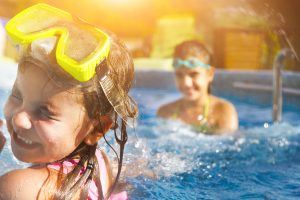During the summer months, kids can lose up to two months of academic gains. On average, students lose two months of reading skills alone! Children are also at risk of losing physical skills during the dog days of summer. As a result, they tend to “veg” more in front of computer games and other electronics. What, exactly, is the summer slide and what can you do to prevent it?
 What Is Summer Slide?
What Is Summer Slide?
The summer slide is the tendency of students to lose a good amount of what they gained during the school year. Students “slide” backward and regress. This is especially of concern for children of low-income households since they tend not to have access to the same materials as children of high-income families. With things being disproportionate as it is, you can imagine how different the opportunities are during the summer months.
Because of this, when school starts back in the fall, teachers spend the first four to six weeks reteaching what kids were taught last year. Imagine the learning time that is lost to this! This summer learning loss is so important, it contributes to the learning gap between children of high-income families and those in low-income households. In addition, summer learning loss builds upon itself. This means that over time, students can become two years, then three years, and then four years behind.
How to Prevent Summer Slide:
Generally speaking, students lose about two months’ worth of academic gains over summer break. To prevent this from happening to your child, there are things you can do. For starters, you can encourage your child to read for 20 minutes a day. Not sure what to read? Check the library for a summer reading list.
In addition to having your children read, you can read to them! Reading to children builds listening skills, engages  their imaginations, and increases their vocabulary. Make sure you’re providing plenty of opportunities for your children to read as well. Rather than encouraging them to play on electronic devices when they come in to cool down, urge them to curl up to a good book.
their imaginations, and increases their vocabulary. Make sure you’re providing plenty of opportunities for your children to read as well. Rather than encouraging them to play on electronic devices when they come in to cool down, urge them to curl up to a good book.
Make sure your child also has access to books in other subject areas. For instance, he could create a math-related book by counting objects and putting together his own journal of those objects.
Furthermore, you can purchase math workbooks for your child to do each day. Also, encourage your child to write letters to relatives or send postcards from camp. If writing the old-fashioned way doesn’t seem appealing, talk to your child about starting a blog instead.
Need some ideas that don’t look like “school”? Encourage your kids to cook, draw, or learn an instrument. You can also sign your child up for a team sport or perhaps swimming lessons or other water sports activities. Start a tech-y project together such as building a robot or a computer. There are plenty of things you can do that don’t look anything like school but that keep those skills sharp nonetheless.
Summer learning loss is real and is a threat to our children’s education. The summer slide is a nickname given to this summer learning loss. To prevent it, it’s best to keep your children actively engaged in language arts and math-related activities. If nothing else, your child may come out of summer being academically ahead of his or her peers!
Tasha Swearingen
Tasha is a homeschooling mom to 5 and has been homeschooling for 14 years. Currently, her children's ages span from toddler to young adult. Tasha has a Bachelor's of Science degree in Social Sciences from Florida State University and is working on her MBA through SNHU/Berklee School of Music.
Latest Posts

Guest Post by Gabriel Morse For several years, I sat for long hours every day behind one of those battleship gray desks in a windowless, dull, gray office. The pay was enough to take care…
Read more >
This post is sponsored by Little Monsters Universe. I'm Tina Salmanowitz, an advocate for homeschooling and science education. With over a decade of experience as a science educator (in class…
Read more >
This post is sponsored by Time4Learning. Before the pandemic, it was business as usual for Boca Raton resident Nikki Warris. Her two daughters, 5-year-old Natalie and 8-year-old Lexi were…
Read more >


